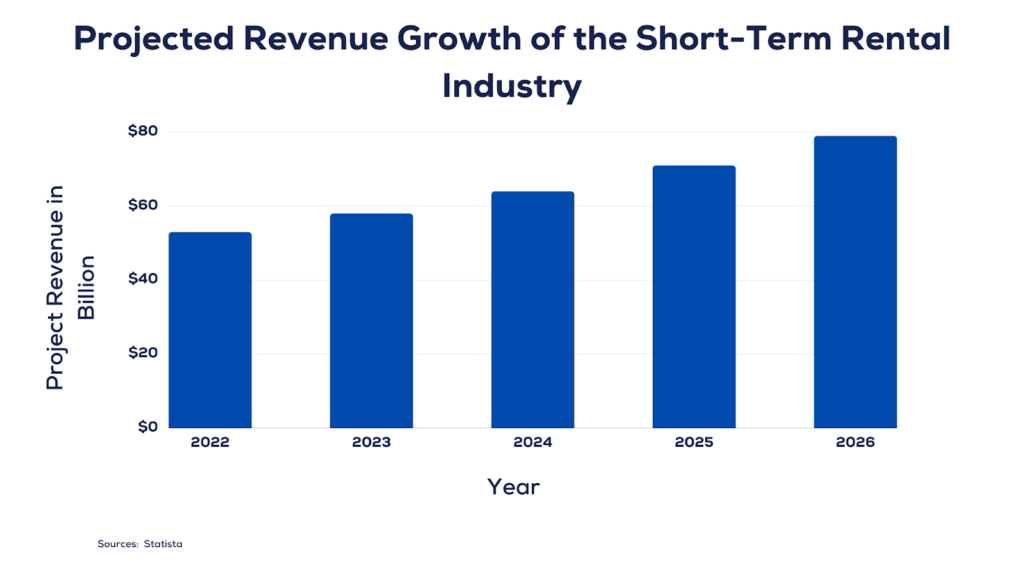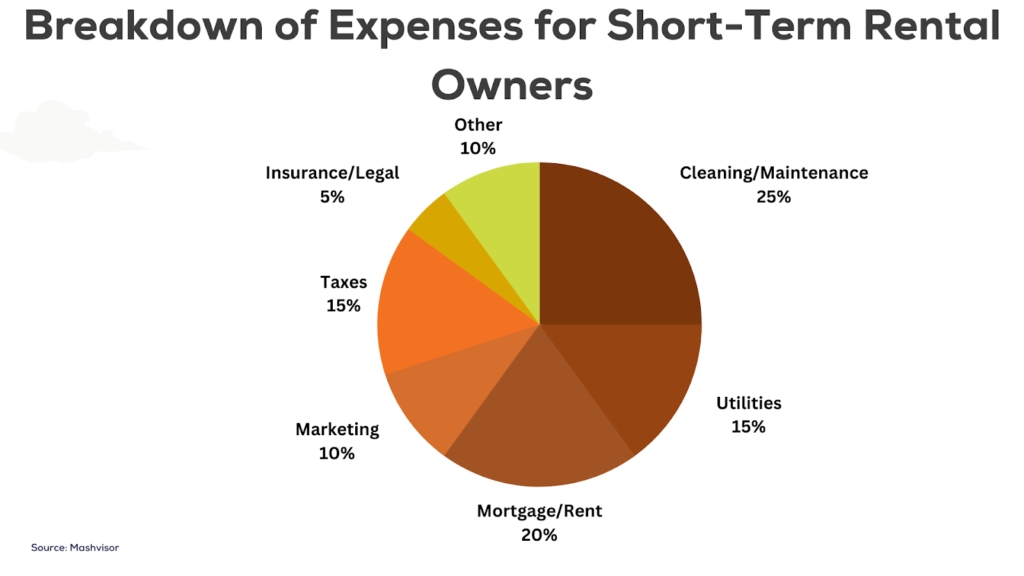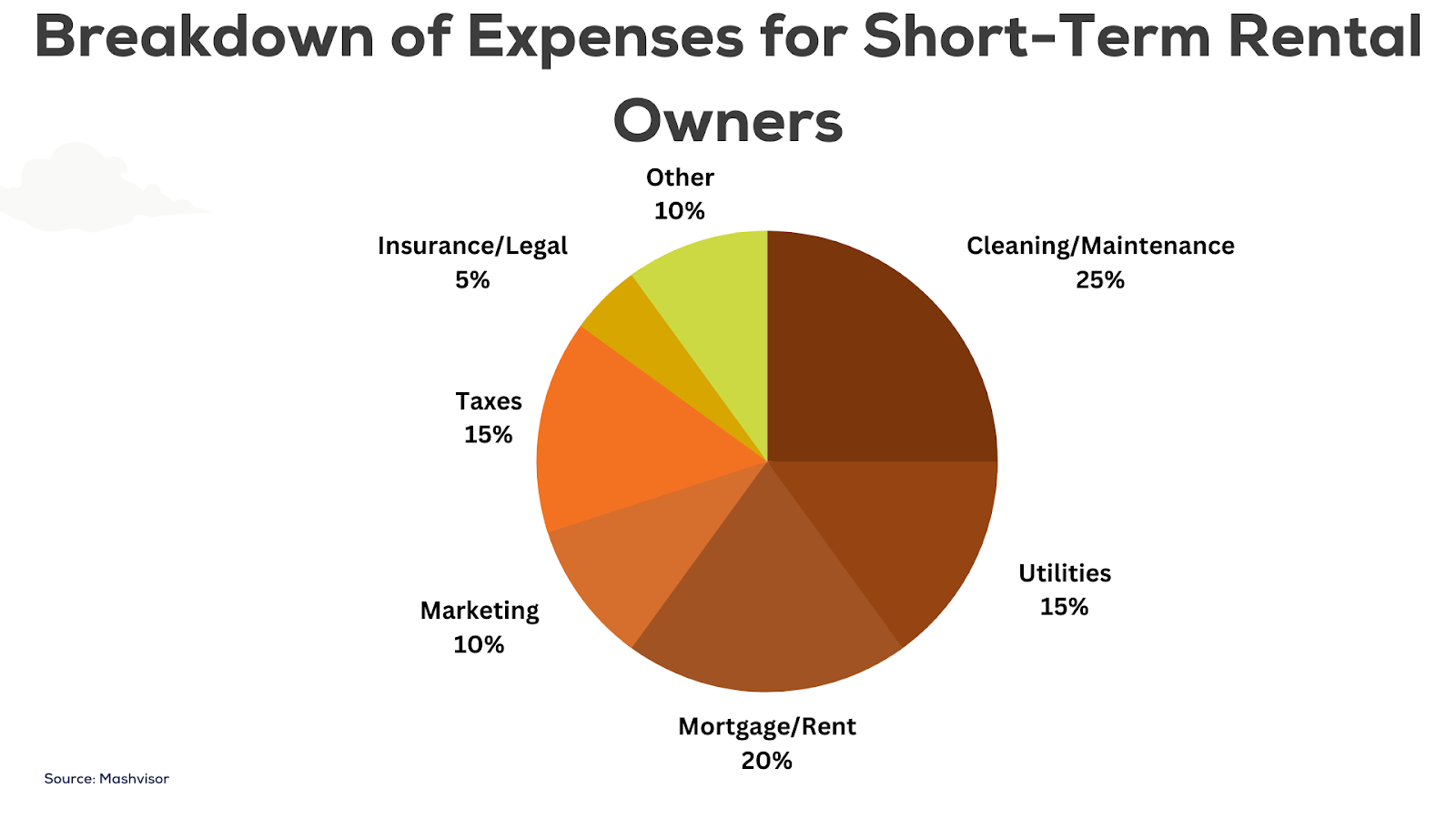The short-term rental industry has seen immense growth in recent years. As the demand for short-term rentals continues to rise, it becomes increasingly important for property managers to optimize their management strategy. Efficient operations are key to maximizing profits in this competitive landscape.
This article discusses strategies to enhance short-term rental property management. By implementing these tips, you can attract more guests, simplify operations, and boost your bottom line.
Table of Contents
Understanding the Short-Term Rental Landscape
The short-term rental market in the United States is booming. Recent projections estimate the industry will grow to $57.7 billion in revenue by 2023, a clear indication of its potential for growth.
With this expansion comes the need for more efficient property management solutions. Streamlining your rental operations is crucial to keeping up with demand while maximizing profits. The tips outlined in this article will equip you to succeed in today’s short-term rental marketplace.
With the rapid growth and profit potential of the short-term rental industry, these properties are also garnering attention from investors.
Many real estate investors are now buying short-term rental properties specifically to operate as short-term rental investments, generating passive income through nightly and weekly rentals. Proper management maximizes ROI for these investment property owners.
To have a clear picture, here is the chart that gives the forecast of the revenue of short-term rental investment in the U.S. for upcoming years.

Source: Statista
The Art of Pricing Your Short-Term Rental
Setting competitive rental rates is key to optimizing your occupancy and revenue. According to AirDNA, implementing a dynamic pricing strategy can increase rental income by up to 40%.
When determining your rates, research the going rates in your area for similar rentals. Consider factors like size, amenities, season, and local events. Adjust your pricing based on demand. Increase rates during peak times and lower them during slower periods or gaps in bookings.
Also, use data from your booking history to inform pricing. Track dates that fill up quickly at higher rates, and those that sit vacant unless prices are dropped. Payment processing tools like Beyond Pricing make it easy to automate dynamic pricing.
Maximizing Occupancy Rates
Your property’s occupancy rate directly impacts its profitability. Here are some tips to maintain optimal booking levels:
- Provide exceptional service – Guests value responsive communication and a smooth booking process. Address inquiries promptly, and resolve any issues quickly to encourage great reviews.
- Update listing photos/details – Refreshing your listing with professional photos and concise details attracts more guests. Highlight amenities like Wi-Fi, parking, and laptop-friendly workspaces.
- Advertise on multiple platforms – List your property on top sites like Airbnb, Vrbo, and Booking.com. Spreading your visibility nets you more bookings.
- Offer discounts strategically – Running occasional promotions, like 10% off three-night stays, incentivizes bookings during slower periods.
Leveraging Technology for Efficient Management
Technology is key to streamlining short-term rental management. Automation tools can drastically expedite response times and simplify tasks like tracking finances.
- Property management software – Options like Hostaway and Guesty help manage listings, bookings, cleaning schedules, payments, etc. Their centralized dashboards save a lot of time.
- Smart home technology – Smart locks allow remote check-ins, while smart thermostats enable adjusting temperatures from your smartphone. Some systems even detect noise and unauthorized guests.
- Payment processing apps – Services like [Avail](https://www.avail.co/hosts) handle collecting payments, taxes, and deposits without manual work. Their integration with rental sites is invaluable.
Effective Budget Management
Proper budgeting is crucial for profitable short-term rental management. Follow these tips to effectively manage costs:
- Track all expenses closely ranging from utilities, supplies, maintenance, mortgages, and taxes, to insurance. Use spreadsheet software or rental management tools.
- Set a realistic budget with a built-in cushion for unexpected costs. Budget extra during peak seasons.
- Reduce operating costs where possible – lower energy bills by installing smart thermostats and eco-friendly lighting. Prevent excessive cleaning/repair costs through preventative maintenance.
- Leverage technology to simplify expense tracking and payments. Apps like QuickBooks help you to automate rental accounting.
- Invest profits wisely. Always put a portion towards maintenance reserves, protecting your assets.
For a clear picture of the situation, here is the typical breakdown of expenses for short-term rental owners:

Source: Mashvisor
Maintaining Your Property
Proper maintenance is indispensable for running a smoothly-operated rental property. Follow these upkeep best practices:
- Conduct regular inspections to identify and address maintenance needs proactively.
- Keep a maintenance checklist. Always inspect safety equipment, appliances, electronics, lighting, plumbing, etc. Replace filters/smoke detector batteries regularly.
- Respond promptly to repair requests and document issues. Use a maintenance log to track required and completed work.
- Deep clean between guests. Besides this, you’ll need to ensure cleaners sanitize surfaces, launder linens, restock supplies, etc.
- Schedule preventative maintenance like pest control, HVAC servicing, and gutter cleaning annually. This prevents bigger issues down the line.
Understanding and Navigating Tax Laws
As a short-term rental host, you must comply with local occupancy tax laws. Here are some tips:
- Research the laws in your city/state thoroughly. Rules vary regarding collecting/remitting taxes, licensing requirements, zoning restrictions, etc.
- Consult a tax professional to ensure you comply with regulations completely. They can help you remit taxes accurately.
- Use software that automatically handles occupancy tax calculations, payments, and filings. This removes tax headaches for hosts.
- Set rental rates higher to account for taxes you must remit, so your profit margins remain intact.
- Dedicate a portion of profits to an escrow account for taxes. This prevents any shortage when payments are due.
Creating a Stand-Out Listing
Your listing is often the first impression potential guests get of your rental. Make it shine by following these tips:
- Showcase your best features prominently. It is best to lead with gorgeous photos and highlight amenities like a pool or hot tub.
- Craft compelling titles like “Sunny 2BR Cottage Steps from the Beach” over generic ones like “Beach House Rental”.
- Spotlight special details like brand-new mattresses or proximity to attractions. Include a guide to local hangouts.
- Earn “Superhost” status by maintaining a 4.8 rating through great service and listing accuracy. The badge builds credibility.
- Refresh your listing regularly – update availability calendars, prices, and photos. Add new sections highlighting recent improvements.
Frequently Asked Questions
1. What are some common challenges in managing short-term rentals, and how can they be addressed?
Common challenges include high guest turnover leading to frequent cleaning/maintenance, monitoring multiple listings/bookings, and keeping costs from ballooning. Using property management software and smart home technology can help streamline operations. Hiring a property manager is another option for oversight support.
2. How can technology be leveraged to improve the efficiency of short-term rental management?
Technology like automated booking/pricing tools, centralized dashboards, smart home devices, digital payment processing, and accounting/tax software can all make management much more efficient. They drastically reduce the time spent on manual tasks.
3. What are some strategies for maximizing occupancy rates for short-term rental properties?
Strategies include strong digital marketing, competitive dynamic pricing, maintaining stellar guest ratings, advertising on multiple listing sites, offering promotions/discounts, adding amenities that attract bookings, and refreshing your listing with pro photos/details.
Final Thoughts
By implementing the strategies above, you can transform your short-term rental business into a streamlined, optimized, and highly profitable operation.
Efficient processes are invaluable in today’s increasingly competitive rental marketplace. With these tips, you’ll be well on your way to rental management success.





